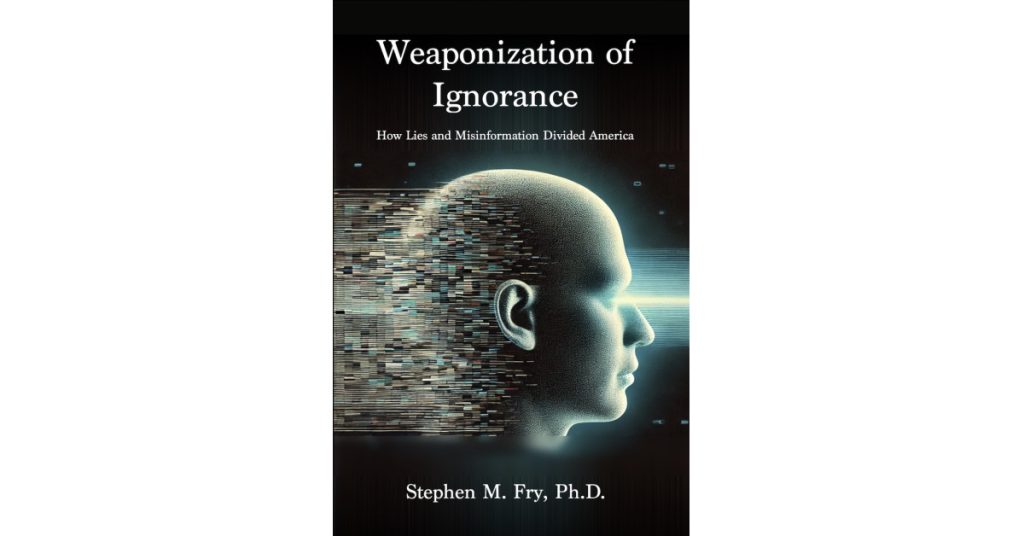Listen to the article
New book by physicist Stephen M. Fry examines America’s misinformation crisis, offering insights into how falsehoods divide society
A new book examining how disinformation has fractured American society and undermined democratic institutions is set to be released this week. “Weaponization of Ignorance: How Lies and Misinformation Divided America” by Stephen M. Fry, Ph.D., provides a comprehensive analysis of how deliberately spread falsehoods have eroded public trust and fostered societal division.
The book, published by SBDI Publishing, argues that today’s information landscape is not merely suffering from a lack of knowledge but from strategically deployed disinformation designed to serve political narratives.
“Ignorance today isn’t simply the absence of knowledge,” Fry writes in the book. “It’s the product of disinformation—carefully cultivated and weaponized to serve the political narrative.”
Fry, a physicist with over four decades of experience in research and corporate leadership, explores how right-wing political movements and their supporting media ecosystems have exploited cognitive bias, identity politics, and emotional manipulation to reshape public perception and belief systems.
The author draws on interdisciplinary research spanning psychology, political science, and media studies to explain the mechanics of modern propaganda. The book details how social media algorithms and partisan news outlets amplify falsehoods and examines the psychological factors that lead even well-educated individuals to reject credible sources in favor of misinformation.
While addressing politically charged topics, Fry’s approach avoids partisan attacks. Instead, the book offers readers a framework for understanding why family members and neighbors might seem to inhabit completely different realities based on their media consumption and political affiliations.
This measured approach comes at a crucial time in American politics, when many families report experiencing deep divisions over political beliefs and information sources. Recent studies by the Pew Research Center have found that Americans increasingly distrust information from media outlets associated with opposing political viewpoints, contributing to what researchers call “epistemic bubbles” where different groups operate with entirely different sets of assumed facts.
Media experts have noted that the fragmentation of information sources, combined with algorithmic amplification on social platforms, has created unprecedented challenges for maintaining a shared national understanding of current events. Fry’s book enters this conversation with both analysis and potential solutions.
Beyond diagnosing problems, “Weaponization of Ignorance” provides strategies for rebuilding truth, trust, and civic discourse. The book aims to equip readers with tools to recognize manipulation techniques and evaluate information sources critically without further polarizing their communities.
Fry brings unusual credentials to this topic. With a Ph.D. in Quantum Electronics and nine technical books already published, his background differs from typical political commentators. His scientific training informs his analytical approach to examining how misinformation spreads and affects society.
“We’re not just dealing with disagreements about policy anymore,” said media scholar Jennifer Patterson in a recent interview (unrelated to Fry’s book). “We’re increasingly living in societies where different groups cannot agree on basic facts. Any serious attempt to address this problem requires understanding both the technological and psychological dimensions.”
The paperback edition of “Weaponization of Ignorance” will be available on Amazon starting November 1, with a Kindle edition following in early 2026. The book’s release comes as social media platforms and news organizations continue to grapple with their roles and responsibilities in the information ecosystem.
As America approaches another election cycle, Fry’s analysis offers timely perspective on one of the most challenging aspects of modern democracy: maintaining a shared commitment to truth in an era of information abundance and strategic manipulation.
Fact Checker
Verify the accuracy of this article using The Disinformation Commission analysis and real-time sources.




14 Comments
Disinformation has become a major threat to democratic institutions. I’m glad to see this issue being examined in-depth, as it’s crucial that we develop effective strategies to address the problem.
Completely agree. Restoring trust in our political system and media will be an immense challenge, but it’s essential for the health of our democracy.
The influence of disinformation on public discourse is a critical issue that deserves careful study. I’m eager to see what insights Fry’s book can offer into this complex problem.
Agreed. Understanding the psychological and political drivers behind the spread of misinformation is key to developing effective countermeasures. This book could provide valuable guidance.
Fascinating topic. I’m curious to learn more about how disinformation tactics have impacted society’s trust in institutions and democratic processes. An in-depth analysis of this issue could provide important insights.
Absolutely, understanding the weaponization of ignorance is critical to addressing the current information crisis and restoring faith in our political system.
This book sounds like a must-read for anyone concerned about the state of American politics and the erosion of democratic norms. I’m looking forward to seeing Fry’s analysis and proposed solutions.
Absolutely. Restoring public trust and fostering a more informed citizenry is essential for the health of our democracy. I hope this book can contribute to that important goal.
The weaponization of ignorance is a concerning trend that has had far-reaching consequences. I’m glad to see this topic being explored in-depth, as it’s crucial that we understand the mechanisms behind it.
Agreed. Combating disinformation will require a multifaceted approach that addresses the underlying social, psychological, and political factors driving its spread.
As someone with a background in science, I’m intrigued by Fry’s perspective on this issue. His insights into the cognitive and psychological factors behind the spread of misinformation could be eye-opening.
Absolutely. Bringing a scientific lens to this problem could yield valuable findings and practical solutions. I’m looking forward to seeing what Fry has to say.
This book sounds like an important contribution to the ongoing discussion around misinformation and its societal impacts. I’ll have to check it out and see what new perspectives the author brings to the table.
Agreed. Combating disinformation requires a multi-faceted approach, so I’m interested to see Fry’s analysis and proposed solutions.